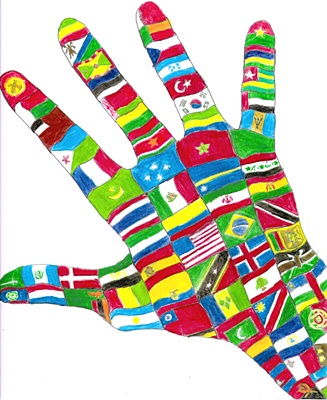All Nonfiction
- Bullying
- Books
- Academic
- Author Interviews
- Celebrity interviews
- College Articles
- College Essays
- Educator of the Year
- Heroes
- Interviews
- Memoir
- Personal Experience
- Sports
- Travel & Culture
All Opinions
- Bullying
- Current Events / Politics
- Discrimination
- Drugs / Alcohol / Smoking
- Entertainment / Celebrities
- Environment
- Love / Relationships
- Movies / Music / TV
- Pop Culture / Trends
- School / College
- Social Issues / Civics
- Spirituality / Religion
- Sports / Hobbies
All Hot Topics
- Bullying
- Community Service
- Environment
- Health
- Letters to the Editor
- Pride & Prejudice
- What Matters
- Back
Summer Guide
- Program Links
- Program Reviews
- Back
College Guide
- College Links
- College Reviews
- College Essays
- College Articles
- Back
Global Interdependence: A Demand of Globalization
"You claim to be at one with 72 religious sects," a public challenge arose before Rumi, a dignified Sufi mystic and thirteenth-century Persian poet, "but the Jews cannot agree with the Christians, and the Christians cannot agree with Muslims. If they cannot agree with each other, how could you agree with them all?" To this Rumi answered, "Yes, you are right, I agree with you too."
The world, one may say, is presented as a depiction of diversity. We are distinct based not only on our appearances and lineage, but also on our beliefs and opinions. The relentless clashes between groups that we witness today do not transpire owing to mere simplicity of diversity, but because how gravely some take differences even to the extremes of bigotry and imposition. Compulsion, what I see, is not an illustration of dedication to one's belief or group. Broadening the insight so one can encompass the quality of acknowledging differences, and still leave room for learning, is the true art of understanding. In order to understand oneself, one must learn to understand others.
The purpose of this article is not only providing a glimpse to what global interdependence really is but also how this time period, unlike before, massively characterized by globalization, can be most favorable for achieving it.
Interdependence is the reciprocated reliance or dependence between individuals or groups. Any of the integrated group or individual is neither completely self-contained nor utterly dependent. Accordingly, removal or withdrawal of some portion from the whole can result in deteriorating the entire reliance. In case of diversity, if we assume humans are interdependent beings, isolation of any single group can upshot unwelcomed consequences to the entire humanity. Robert Putnam, Harvard political scientist, also infers: "the problem isn't ethnic conflict or troubled racial relations, but withdrawal and isolation."
Interdependence is also a cosmological fact. To argue on this subject, particularly, is not within the scope of this article, however, I feel obliged to present a stimulating comment regarding this matter for readers. Alexander Spirkin in his book, Dialectical Materialism, teaches the concept of universal connection: "Nothing in the world stands by itself. Every object is a link in an endless chain and is thus connected with all the other links. And this chain of the universe has never been broken; it unites all objects and processes in a single whole and thus has a universal character. We cannot move so much as our little finger without 'disturbing' the whole universe. The life of the universe, its history lies in an infinite web of connections."
Global Interdependence, the dependency of human beings on each other, will not be built on mere biological or anthropological common grounds; rather on the fact that the entire humanity is inseparably connected by the bonds of emotional thoughts and purposes, and by the fabric of the universe itself. Once a person starts accepting this reality, distinct races, religions, or opinions become out-and-out superficial.
Now, let us recall the definition of globalization: "the process of ideas, products, and people moving around the planet with greater ease and efficiency." Globalization has made humanity more linked. A study reveals that 1/4th of the planet today is connected. Apart from worldwide economic integration, customs and cultures of regions, which are separated by distances, can be reached out to effortlessly. Owing to internet and modern conveniences, the dissemination of thoughts has boosted manifold, even among the common masses. Approximately, more than half of the world's population now uses the internet.
Obviously, this provides an open gateway to bias and discord, even bigotry and abuse. But, at the same time, this is also an opportunity to be associated with the world with acknowledgment. Humanity finds herself at the crossroads. In order to avail all-inclusive advantage of what globalization is offering us at present, we need to unshackle ourselves from contingencies of biological, ethnical and familial identities, and embrace the quality of understanding, wholeheartedly. Globalization is demanding global interdependence; global interdependence is demanding the art of understanding.

Similar Articles
JOIN THE DISCUSSION
This article has 0 comments.

Globalization in this age might just be offering us headway towards global interdependence, that is, if we are willing to embrace the art of understanding.